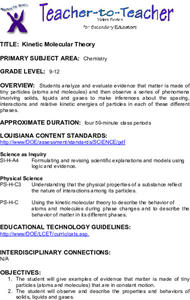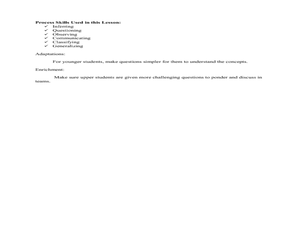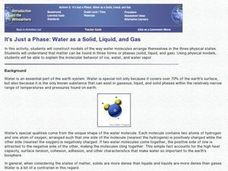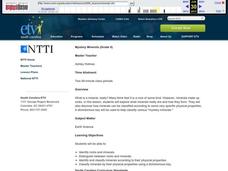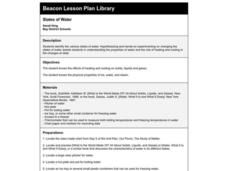NASA
Einstein's Gravity
Assist your high school class with researching and applying the principles of gravity so they may further understand why Einstein is so widely recognized, even today. Individuals compare and contrast two different models that demonstrate...
NASA
Two Versions of Gravity: Newton and Einstein
We have all heard the debate about teaching both theories, but an innovative instructional activity takes the discussion to a new level. Scholars research and debate Newton's Law of Gravitation versus Einstein's General Theory of...
Royal Society of Chemistry
Equilibria—Gifted and Talented Chemistry
Teaching is a balancing act! Keep things on an even keel with a comprehensive equilibrium lesson plan. The resource covers reversible and irreversible reactions, Le Chatelier's Principle, and the industrial applications of equilibrium...
Curated OER
Invisible Investigations
Students simulate how charged particles move in a particle detector. In this physics lesson, students observe how iron filings behave when magnetic marbles are passed underneath them. They record and draw their observations.
Curated OER
To Float or Not to Float - A Lesson on Density
Pupils define density in their own words. In this physics lesson, students calculate density using mass and volume. They explain why some objects sink and some float.
Curated OER
Spectroscopy Demonstrations
Students study light and see what emits photons and that light can be separated onto a spectrum. In this energy and matter instructional activity students identify gases using a spectrum chart.
Curated OER
Water and Ice
Students explore the states of water. In this water states activity, students observe ice over time and the changes that take place. Students read a related text and draw their observations in a journal entry. Students discuss the...
Curated OER
Up, Up, and Away
Second graders observe the changes that water has when there is a change in a state of matter. In this lesson they observe the results of applying heat to water with the end result of conversion to a gas.
Curated OER
The Same But Different
Third graders observe a frozen container filled with ice and discuss what happens when the ice sits out in the room. They practice measuring the mass and volume of the ice, watch as the frozen container is placed in a warm water bath to...
Curated OER
Water and Ice
Students explore what happens to water as it goes from solid to liquid and back. In this state of matter lesson, students observe, measure, and describe water as it changes state.
Curated OER
Properties of Materials - Part B
Students describe the history of materials. They use the kinetic (particle) theory to explain changes of state in matter and trace the flow of heat during changes of state and chemical changes.
Curated OER
Kinetic Molecular Theory
High schoolers analyze and evaluate evidence that matter is made of tiny particles. They observe a series of phenomena involving solids, liquids, and gases to make inferences about the spacing, interactions and relative kinetic energies...
Curated OER
Heat Energy
Young scholars study how matter changes from solids to liquids or liquids to solids. In this physical science instructional activity, students discuss heat energy and experiment with heat by changing a candle into a liquid using a hot...
Curated OER
Water Cycle
Ninth graders explore ways water moves through various reservoirs on Earth, examine how human activities change water cycle, investigate substances present in water that indicate human activity, and discuss how understanding water cycle...
Curated OER
It's Just a Phase: Water as Solid, Liquid and Gas
Students construct models of the way water molecules arrange themselves in three physical states - solid, liquid, and gas. They explain the molecular behavior of ice, water, and water vapor.
Curated OER
Marshland Ecosystems
Students identify animals in ecosystem depicted on 16th Century ceramic basin and classify them as herbivores, carnivores, or omnivores based on physical characteristics and prior knowledge, determine which life forms in ecosystem are...
Curated OER
Mystery Minerals
Students minerals and how they form. They investigate the classification of minerals according to physical properties. Students watch a video about mineral characteristics. In groups, students participate in hands-on activities and...
Curated OER
Types of Chemical Reactions Lab
In this chemical reactions activity, students experiment with several different reactions and identify each as a single replacement, double replacement, synthesis, decomposition or combustion reaction. Students observe the changes in...
Curated OER
Mr. and Miss Big Feet
Third graders experiment with gravitational force. In this physical science lesson, 3rd graders send matchbox cars off a ramp while changing the amount of weight attached to the car. Students record their data and discuss the results.
Curated OER
The Sun Affects Earth
Third graders read, write, and listen to information about the sun and its effects on the Earth.as it relates to its axis, orbit, rotate, and revolution. In this solar system lesson, 3rd graders examine how the sun effects the Earth's...
Curated OER
STATES OF WATER
Students identify the various states of water. They use hypothesizing and hands-on experimenting on changing the states of water, the properties of water, and the role of heating and cooling in the changes of state.
Curated OER
Good Food, Good Health
Students investigate how food provides energy for the human body. In this physical health lesson, students access online resources to identify how certain foods can affect their health. Students discuss how many servings of each food...
Curated OER
Reaction Reasoning
Third graders experiment with chemical reactions and examine what happens to the atoms when different reactions occur. In this matter lesson students divide into groups and complete a lab experiment.
Curated OER
"If the facts don't fit the theory, change the facts"
Students read a paper describing Einstein's 1905 papers. They answer five teacher-provided questions in small groups to consider the importance of his findings. Students describe in personal writings what effect they think these findings...













